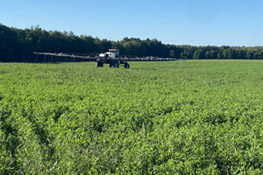
Northern NY; August 25, 2021. The biocontrol nematode science developed in northern New York to manage alfalfa snout beetle is now being tested for the reduction of other agricultural pests in the Midwestern U.S.
With a long-term commitment from the farmer-driven Northern New York Agricultural Development Program (NNYADP) to find a solution, Cornell University entomologist Elson Shields, Ph.D. and Research Support Specialist Antonio Testa pioneered the science behind the use of native biocontrol nematodes to first manage alfalfa snout beetle on northern New York dairy farms. Their subsequent research has shown biocontrol nematodes to also be effective in managing corn rootworm, wireworm, berry root pests, and some pests of organically-grown root crops.
The success of this research has fostered trials now underway in multiple states.
“We faced huge losses to alfalfa snout beetle, the farmers who direct the Northern New York Agricultural Development Program made a commitment to however long it would take to develop the real-world science needed to find a solution. Today, the success of the research made possible by that steadfast commitment is paying off not only for alfalfa growers and dairy farmers in northern New York, but for the growers of multiple crops in multiple states and Canada,” said NNYADP Co-Chair Jon Greenwood, Madrid, New York.
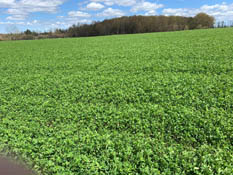
Shields conducted trials of the biocontrol nematodes for corn rootworm management in Texas in 2017. In 2019, he tested delivery of the biocontrol nematodes via a center pivot irrigation system on a farm in southeastern New Mexico.
In May 2021, Shields delivered a concentrated slurry containing the biocontrol nematodes to two 140-acre center pivot locations in western Nebraska. The slurry was diluted prior to application. Shields notes, ” The application in Nebraska was made about the time of the corn rootworm hatch there. In early July, the farmer reported only minimal root damage to his corn and almost no corn rootworm larvae. This is excellent news as corn rootworm as been overrunning whatever-traited corn he has planted.”
An independent public company has awarded funding for four years of biocontrol nematode trials for reducing corn rootworm in Iowa, Illinois, and Nebraska. The company is also funding internal trials in southwest and central Wisconsin and in Minnesota.
Additional trials are ongoing at several farms in Ontario, Canada. In Alabama, an Auburn University entomologist is evaluating the protocol for managing billbugs that damage lawn, sod, and grass crops.
In August 2021 in northern New York, agricultural entrepreneur Mary DeBeer will make a trial application of the biocontrol nematodes on a potato field bothered by wireworms. DeBeer established a biocontrol nematode-rearing laboratory on her family farm in Moira, New York, in 2016. Shields has advised DeBeer on the combined strains of nematodes and the rate of application to apply to the potato field.
The history of the science and success of Shields’ biocontrol nematode research in field crops and berry crops is posted on the NNYADP website at https://www.nnyagdev.org. Cornell Cooperative Extension trials in northern New York further proved that the biocontrol nematodes could survive application in a manure solution so farmers can accomplish crop fertilization and pest protection as one task.
Funding for the Northern New York Agricultural Development Program is supported by the New York State Legislature and administered by the New York State Department of Agriculture and Markets.
# # #
Click here for NNYADP biocontrol nematode research reports
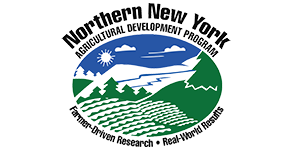 The history of the science and success of Shields’ biocontrol nematode research in field crops and berry crops is posted on the NNYADP website at
The history of the science and success of Shields’ biocontrol nematode research in field crops and berry crops is posted on the NNYADP website at 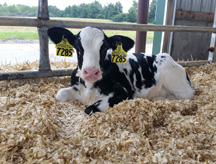
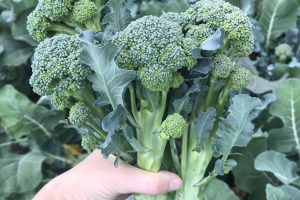 “Montebello” green variety of sprouting broccoli harvested from the NNYADP mini-brassica crops research trial at the Willsboro Research Farm on May 23, 2021. Photo: Elisabeth Hodgdon
“Montebello” green variety of sprouting broccoli harvested from the NNYADP mini-brassica crops research trial at the Willsboro Research Farm on May 23, 2021. Photo: Elisabeth Hodgdon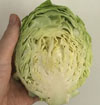
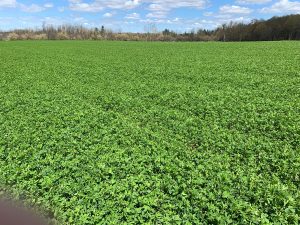 June 15, 2021. Cornell University Entomologist Elson Shields, Ph.D., shared this May 2021 photo of a lush alfalfa field in North Bangor (Franklin County), New York, with a note that prior to an application of biocontrol nematodes four years ago this field could grow nothing more than grass hay. It has now been restored to a substantial contribution to the farm’s cropping plan. Long-term support from the Northern New York Agricultural Development Program made possible Shields’ research to develop the science needed to find a nature-based solution for managing the #1 destructive pest of alfalfa crops, alfalfa snout beetle. That solution is now working in multiple states to combat different crop and berry pests. Photo: Elson Shields
June 15, 2021. Cornell University Entomologist Elson Shields, Ph.D., shared this May 2021 photo of a lush alfalfa field in North Bangor (Franklin County), New York, with a note that prior to an application of biocontrol nematodes four years ago this field could grow nothing more than grass hay. It has now been restored to a substantial contribution to the farm’s cropping plan. Long-term support from the Northern New York Agricultural Development Program made possible Shields’ research to develop the science needed to find a nature-based solution for managing the #1 destructive pest of alfalfa crops, alfalfa snout beetle. That solution is now working in multiple states to combat different crop and berry pests. Photo: Elson Shields